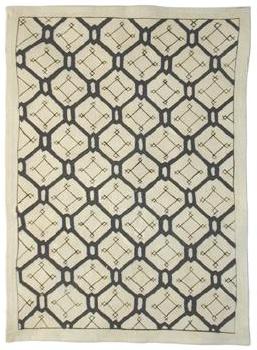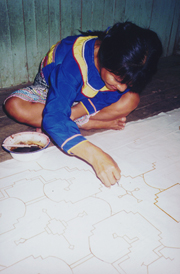- In stock, ready to ship
- Inventory on the way
These herbal Shipibo Eye Pillows and Sachets are available in two natural colored fabrics. De-stress and pamper yourself with five aromatic combinations: lavender, calendula, pepperment, rosemary and lemongrass. One World Projects supports this and other artisan communities in Peru through scholarships and creating a market for their products.
- Herbal Eye Pillow - 7-1/2” long x 3-3/4” wide x 1” thick
- Herbal Sachet - 5" long X 3" wide x 1" thick
|
Peace: |
Relaxing Lavender |
|
Serenity: |
Calming Lavender and Calendula |
|
Alive: |
Stimulating mix of Peppermint, Bay Leaf, Orange Peel, Pine, and Cinnamon |
|
Wake-up: |
Stimulating mix of Rosemary, Lavender and Lemon Peel |
|
Refresh: |
Restorative mix of Lemongrass, Orange Peel, Peppermint, and Bay Leaf |
Handmade in Peru. Imported by fair trade standards.
The Shipibo artistic process utilizes hand-woven cotton, either natural un-dyed or dyed in mahogany bark, to bring in a rich brown color. The artisans paint the fabric with a pointed piece of bamboo using the juice of the crushed Huito berry fruits, which turns into a black-brown dye when exposed to the air.
No two designs are the same; all have the unique touch of the individual artisan and are tailored by her inspiration and creativity. Through these designs, one can experience the spirtual power that connects Shipibo village life with the ancient spirit world and the power of the rainforest.
 The painting and embroidery of the patterns begin in the center of the fabric. A cross pattern prevalent throughout the painting represents the physical world. This cross represents the perpetual spirit of a person, the joining together of the masculine and feminine principles or procreation and the cycle of life. The swirling lines that are interwoven among the geometric patterns represent the cosmic universe and spirit world.
The painting and embroidery of the patterns begin in the center of the fabric. A cross pattern prevalent throughout the painting represents the physical world. This cross represents the perpetual spirit of a person, the joining together of the masculine and feminine principles or procreation and the cycle of life. The swirling lines that are interwoven among the geometric patterns represent the cosmic universe and spirit world.
These visual patterns that represent the spirit world are important in Shipibo culture. The Shipibo women masterfully convert the ancient designs into symbols that function as channels connecting the ancient culture with the spirit world. Unpretentious yet elaborate geometric designs cover the textiles and pottery that, according to Shipibo legend, bring them into harmony with each other and the universe.

The Shipibo peoples are found in remote parts of the Amazon river basin. Even with contact to the developed world growing daily, the tribes have maintained a culture rooted in and to their ancestral environment. Every facet of their lives is influenced by the natural world. This aspect of their culture is reflected in art such as these eye pillows and sachets.
By drinking a natural tea whose recipe is passed down each generation, the tribe members enter an enlightened state of realization where they can see the patterns of the universe that are believed to signify the patterns of our beings in the universe. The geometric lines signify the order of our cosmos that is repeated for all eternity across the many facets of our being - rivers working their way through the world, stars trekking across the night sky, the veins of the universe.
 Shipibo women are the principal artists of this tribe. As young girls, piri piri drops are placed in their eyes which, according to Shipibo legend, allows them to see patterns and designs beyond the physical world. This results in each finished piece, even though a single set of hands has created it, delivering an image all artisans identify and comprehend, as they have seen the same distinctive pattern the universe has assigned to objects in the physical world. No two pieces of Shipibo art are the same, just as no two objects or beings are exactly the same. Each piece represents its own unique aspect of the universal order.
Shipibo women are the principal artists of this tribe. As young girls, piri piri drops are placed in their eyes which, according to Shipibo legend, allows them to see patterns and designs beyond the physical world. This results in each finished piece, even though a single set of hands has created it, delivering an image all artisans identify and comprehend, as they have seen the same distinctive pattern the universe has assigned to objects in the physical world. No two pieces of Shipibo art are the same, just as no two objects or beings are exactly the same. Each piece represents its own unique aspect of the universal order.
In many tribal environments, resources are scarce and material belongings are limited to items essential for survival – both physical and spiritual. The Shipibo are no exception to this. In an effort to express their unique take on the cosmos, their artwork has been incorporated into their daily lives by being applied to a wide variety of goods from traditional low-fire terra cotta pots, to painted cloths and embroidered textiles. The sacred nature of their work remains central to their way of life. As much as we may hope to understand the culture and vision of the Shipibo, the true meaning of their adornment remains somewhat of a mystery to the world outside of the Amazon rainforest. We can take pleasure in the work that reaches us from their remote homelands, and marvel at their skill and creative inspiration.






